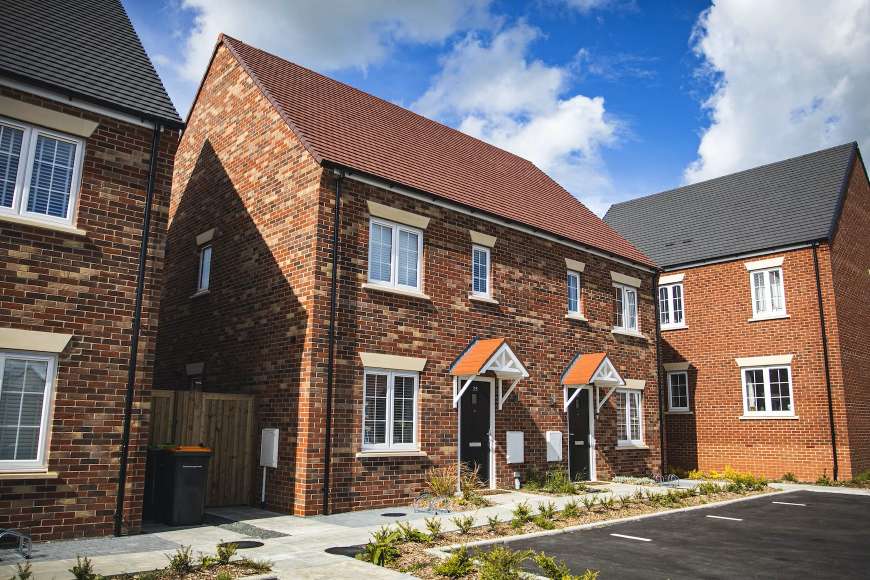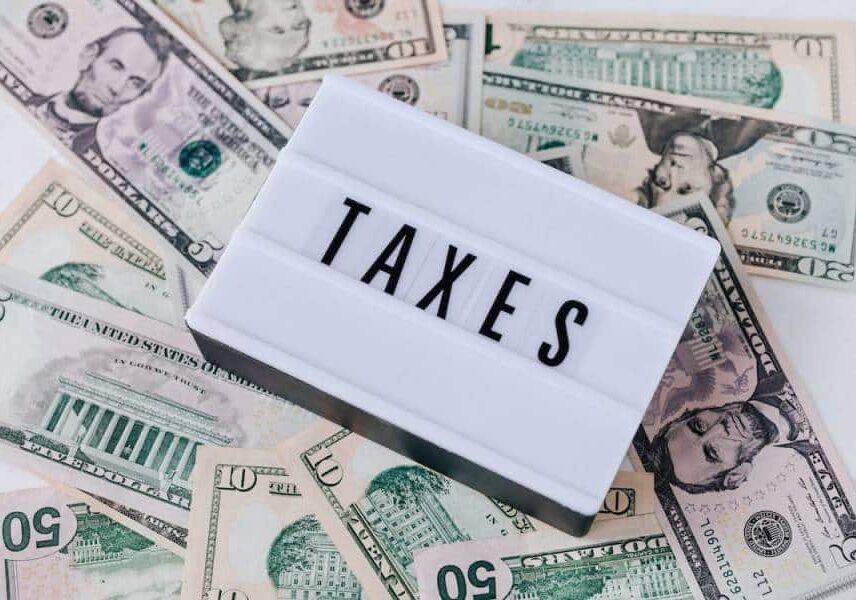For UK non-residents, owning a property in the UK can be an appealing option because of its long-term financial benefits. But with that comes understanding and adhering to all the different taxes associated with property ownership in the UK. Even for experienced homebuyers, understanding UK property taxes can be daunting.
This guide is designed to help you understand your tax obligations as a non-UK resident property owner so that you can make informed decisions about your investment.
We’ll cover everything from stamp duty and inheritance tax to property tax in the UK vs the US and more – read on for a comprehensive overview of UK property tax for foreigners and non-UK residents.
UK Property Taxes for Non-Residents
It’s essential to be aware of what you’ll need to pay in property tax when buying a house in the UK. One of the most important things to be aware of regarding tax when purchasing a UK house is that, as a non-resident, you will be subject to Stamp Duty Land Tax (SDLT) on any property purchase.
Stamp duty ranges from five to twelve percent of the purchase price for UK residents, and this property tax is raised by two percent for non-UK resident property buyers.


Council tax
Another thing to be aware of when buying residential properties in the UK is the UK council tax. This is a system of local taxes collected by local tax authorities.
Council tax is a property tax levied against a residential property. A tax valuation band is assigned to a property based on the estimated purchase price of what it would have been worth in April 1991 or the property value at the time it was constructed, any time after that date.
Based on this tax system, an old property today that has significantly increased in value in the housing market in the last 30 years could be in a low valuation band for annual property taxes.
An example is a house worth £350,000 ($425,000) in London today that should fall into the valuation band H, which costs £1,728 ($2,100) in annual tax. If this house was valued at £80,000 ($97,290) in April 1991, the house would be assigned the valuation band D, which incurs a charge of £864 ($1,050) per annum.
It’s also much cheaper for annual property tax in the UK vs in the US. A £500,000 ($608,000) house in Westminster in the highest band could incur a property tax charge of £1,728 annually, whereas a place of the same value in Manhattan would cost £8,088 ($9,817) annually.
Suppose you’re interested in buying property in London, for example. In that case, you can refer to a London, UK property tax calculator for more accurate figures on what you can expect to pay for rental property tax in the UK.
An important thing to note regarding property taxes for a UK rental property is that the tenant would be liable to pay council tax under a certified lease, but in the case of a short-term rental property like Airbnb, the landlord would be responsible.
UK Rental Income Tax for Non-Residents
UK property tax for foreigners can be tricky, but regardless of whether you’re a UK tax resident or non-resident, renting out an investment property you own in the UK comes with a rental income tax that must be paid.
You are typically classified as a non-resident by His Majesty’s Revenue and Custom (HMRC) if you:
- Spend fewer than 16 days in the UK (or 46 days if you have not been a UK resident for the three previous tax years)
- Worked abroad full-time (averaging at least 35 hours a week)
- Spend fewer than 91 days in the UK, of which no more than 30 were spent working
Residency classification is often complex. Even if you possess a work visa like the Secondment Work Visa that comes with residency, you’ll still be classified as a non-resident if you spend a certain amount of days outside the UK. Feel free to refer to the Statutory Residence Test (SRT) if you want to confirm your residency status.
Non-Resident Landlord Scheme (NRLS)
The UK’s Non-Resident Landlord Scheme (NRLS) is a UK government initiative introduced to ensure that UK rental property tax is paid by individuals who don’t reside in the UK but rent out UK properties they own. It obligates a rental agency or tenant to withhold tax from rental fees owed to a non-UK resident property owner.
NRLS automatically applies UK tax to any non-resident who owns UK rental property.
However, completing the NRL1 form allows non-resident landlords to bypass the NRLS and receive rental income in full. The income tax on rental income would then be paid at the end of the tax year through a Self-Assessment tax return.
How to pay tax on your rental income
The first step to paying UK tax is registering with HMRC. You can do this by completing a Self-Assessment tax return online. Whether you’re a citizen, a skilled worker on a UK work visa, or a non-resident, this is a form that all taxpayers must complete in order to calculate their tax liability.
You have two options to pay rental income tax in the UK:
- Your letting agent or tenant can withhold tax due and pay directly to HMRC through NRLS.
- You can complete the NRL1 form and receive your rent in full to pay tax through Self-Assessment.
Even if no taxes are due, non-resident landlords must file a Self-Assessment tax return at the end of the tax year.
When you file your UK Self-Assessment tax return as a non-resident landlord, you would declare your rental income in full or your total rental income plus deductions withheld by the letting agent or tenant. Any expenses, such as agent fees, insurance, and repairs, should also be declared.
Receiving your rental income in full
If you wish to receive your rent in full and pay UK real estate taxes on your rental income through Self Assessment, you’ll need to complete and return the NRL1 form to inform HMRC that you’re a non-resident landlord.
If your application is approved, HMRC will inform your rental agent or tenant that tax will not be deducted from rent, and the landlord will be required to report income on the tax return.
Please note that NRL1 approval is not guaranteed, and if you are late with your tax payments or returns, HMRC could revoke your application.
Receiving your rental income with tax deducted
Tax on rent is automatically withheld by a letting agent or tenant on a quarterly basis. The amount is set at the basic rate and calculated by HMRC once you complete your tax return.
How to fill in your self-assessment tax return
UK residents have the luxury of completing their Self-Assessment tax return online. However, as a non-resident, you’re obligated to complete the online Self-Assessment and the SA109 and SA105 forms.
Filling in the forms can be done by post, using form-filling software provided by HMRC, or through approved UK tax specialists.
Failing to meet the filing deadlines may result in fines and other penalties that can have negative tax implications, such as revocation of NRL1 approval, so make sure you are aware of your obligations and know when to file.
Property owned by a non-resident company or trust
If a foreign or non-resident company or trust receives rental income from a UK residential property, it will be considered a non-resident landlord. It will also be classified as a non-resident landlord if its head office is outside the country or incorporated outside the UK.
If your company is a UK tax resident, it will receive rental income in full. This includes UK branches of companies with offices abroad registered with HMRC for UK corporation tax.
If a trust receives income from a UK residential property and all trustees live outside the UK, it is deemed a “non-resident landlord.”
UK rental income tax rates for non-resident landlords
Your total income determines your UK income tax rate. UK rental income contributes to your total income earned. UK Income tax rates are:
- Personal allowance: 0 percent for income up to £12,570 ($15,250)
- Basic rate: 20 percent for income between £12,571 and £50,270 ($15,250 and $61,000)
- Higher rate: 40 percent for income between £50,271 to £150,000 ($61,000 and $182,000)
- Additional rate: 45 percent for income over £150,000 ($182,000)
For more accuracy when calculating how much you owe in UK tax from your rental income every tax year, you can use a UK property tax calculator. It’s an excellent tool to use for tax purposes.
UK Capital Gains Tax for Non-Residents
It’s obligatory to pay Capital Gains Tax on gains made on property and land in the UK, even as a non-resident. However, one of the tax benefits of owning a UK home is unless you return to the UK within five years, you do not have to pay Capital Gains Tax on other UK assets, such as shares in UK companies.
You must file a Capital Gains Tax return for non-residents if you sold UK property or land before 5 April 2020. For property sales from 6 April 2020, you will need to record and pay your non-resident capital gains tax.
Property that comes under UK Capital Gains Tax is determined as:
- Residential property or land
- Non-residential property or land
- Multi-purpose property or land
- Assets that derive at least 75 percent of their value from land in the UK (indirect disposals)
Capital Gains Tax in the UK applies to:
- A non-resident of the UK
- A non-resident landlord
- The personal delegate of a deceased non-resident
- A non-resident in a partnership
- A non-resident trustee
- A UK resident who fulfills split-year requirements and you make the gain in the overseas part of the tax year
After you complete the conveyance, you must report your gains to HMRC and pay the tax within 60 days.
As of 6 April 2019, all non-resident companies are taxed on UK real estate gains through corporation tax rather than Capital Gains Tax.

Payable amounts for UK capital gains
The amount that would need to be paid for capital gains on real estate will depend on the sale or disposal of one of the following:
- A UK residential property from 6 April 2015
- A non-UK residential property or land from 6 April 2019
- Indirect disposal of land in the UK from 6 April 2019
On 6 April 2015, Capital Gains Tax was imposed on the sale of residential property in the UK. From 6 April 2019, the scope of the tax was expanded to non-residential and commercial properties and land, and indirect disposals of UK property and land.
The tax rate for individuals
Capital Gains Tax for individuals is charged at either ten percent or 18 percent for basic rate taxpayers. The rate for higher or additional rate taxpayers is either 20 percent or 28 percent.
The applicable tax rate will be calculated using the non-resident’s UK-derived income for the tax year. The annual tax exemption for individuals will reduce the taxable amount by £12,300 ($14,900).
The tax rate for non-resident trusts
A non-resident trust is subject to a capital gains tax of 28 percent. It will also be eligible for an exemption at half the rate of an individual’s. The tax is divided among trusts established by the same settlor.
Stamp Duty Land Tax
Stamp Duty Land Tax (SDLT) is a tax charged on the purchase of property in England and Northern Ireland. It is paid by the buyer to HMRC and is calculated based on the property’s price.
The amount of stamp duty you pay depends on whether the property is residential or non-residential and how much it costs. For residential properties valued above the tax-free allowance of £255,000, stamp duty is charged at different rates depending on the value of the property:
- Properties worth up to £255,000 ($310,000) are exempt from stamp duty
- Properties worth between £250,001 and £925,000 ($1.12 million) are subject to a five percent tax
- Properties worth between £925,001 and £1.5 million ($1.82 million) are subject to a ten percent tax
- Properties over £1.5 million are subject to a twelve percent tax
For non-residential freehold properties:
- Properties worth up to £150,000 ($182,500) are exempt from stamp duty
- Properties worth between £150,001 and £250,000 ($304,000) are subject to a two percent tax
- Properties over £250,001 are subject to a twelve percent tax
For non-residential leasehold properties:
- Properties worth up to £150,000 are exempt from stamp duty
- Properties worth between £150,001 and £5 million ($6.08 million) are subject to a one percent tax
- Properties over £5 million are subject to a two percent tax
Stamp duty in England and Northern Ireland is increased by two percent if you purchase UK real estate in addition to another residential property you own elsewhere unless the UK property becomes your primary residence on the same day.
An individual may also pay less or no SDLT in cases such as the property being left to them in a will, the assessed value is less than £40,000 ($48,680), or it was transferred because of divorce or separation.
Scotland and Wales
The Scottish and Welsh land tax systems work similarly to SDLT but under different names.
Scotland: Buildings Transaction Tax (LBTT)
Wales: Land Transaction Tax (LTT)


Inheritance Tax
All individuals with assets in the UK are obligated to pay inheritance tax to the UK government. The taxable threshold for inheritance tax is the value of the assets above £325,000 ($395,000). The value of assets below £325,000 makes up the tax-free allowance. The tax standard inheritance tax rate is 40 percent.
An example would be if a property is valued at £500,000, the taxable amount for inheritance tax would be £175,000 ($213,000).
One of the tax benefits of owning a UK home as a non-tax resident for tax purposes is that you don’t have to pay UK tax on worldwide income or assets. While the UK inheritance tax applies to foreign income and assets for UK residents, you only pay inheritance tax on UK-based assets as a non-resident.
The Bottom Line
Buying UK real estate can be a great place to invest your money. Whether looking for a second home or an investment in real estate in order to gain UK citizenship, you’ll find great value in the UK property market.
UK property taxes can be a lot to get your head around, so make sure to seek tax advice from UK real estate specialists before deciding to buy property.
Frequently Asked Questions about UK Property Taxes
Are there property taxes in the UK?
Yes, there are property taxes in the UK. You will normally pay property tax on the purchase as well as a property tax paid annually if you own residential real estate.
What is the property tax rate in the UK?
The property tax rate for Stamp Duty Land Tax in England and Northern Ireland is between two and twelve percent for a residential property valued at £255,00 and over £1.5 million.
Tax rates are between two percent and twelve percent for a freehold non-residential property valued at £150,00 and over £250,001.
In Scotland, the property tax rate for Land and Buildings Transaction Tax is between two and twelve percent of properties valued at £145,00 ($176,500) and over £750,000 ($912,000).
In Wales, the property tax rate for Land Transaction Tax is between six and twelve percent of properties valued at £225,00 ($274,500) and over £1.5 million ($1.82 million).
What taxes do property owners pay in the UK?
The taxes that property owners pay in the UK is income tax and council tax.
How do property taxes work in the UK?
The way property taxes work in the UK is a sales tax known as a Stamp Duty Land Tax is charged on the sale of a property in addition to Value Added Tax (VAT).
Owners of property in the UK must pay tax annually to the local government. This tax is based on property prices at the time the property was built, starting from 1 April 1991.
UK Tax liability for property owners also requires them to pay tax on rental income from property in the UK. This would need to be declared on a Self-Assessment tax return at the end of the tax year.


